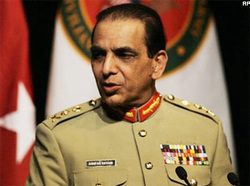 In a Hindu Op-Ed today, Praveen Swami comments on Narendra Modi's explicit statement that he would authorize the use of covert force against our enemies across the border (Dawood, Jihadists in Pakistan and Afghanistan, et al). Swami takes a dovish view of Mr. Modi's statement - he believes that India should not retaliate with covert action because of the fear of retaliation. In my opinion, this view is what has emboldened our enemies over the past 60 years of our independence. We have to moderate our policies in keeping with the neighbors and adversaries we have. The Israelis retaliated with overwhelming force whenever they were attacked, and that is the way the Arabs surrounding them stopped troubling them or sheltering terrorists who used their soil to launch attacks. These high-fangled Western liberal notions of not using force will work very well in a geo-political environment that respects it. Unfortunately, we have a neighbor that constantly provides aid and succor to forces against us, and we have done little other than complain like a little whining child. This has emboldened the ISI, The Pakistani Army, and even democratically elected governments there to conclude that India will never take action. With impunity they incite, recruit, train and then send terrorists over the border. Pakistan Occupied Kashmir is home to many terrorists training camps where jihadists are brainwashed, trained, and then infiltrated across the border. Like the Arab countries ringing Israel, Pakistan understands only the language of force. If we do not retaliate with force, they will continue to view us as as a weak, spineless debating society, and continue to take potshots at us. We must launch targeted covert strikes, take out leaders of any organizations that are inimical to us, and even launch missile strikes against terrorist training camps in Kashmir. Only then will we put some fear into them, and get them to stop. Even if that means there's a risk of retaliation, we must be prepared to run that risk, and raise our internal vigilance. "Speak softly but carry a big stick," said US president Teddy Roosevelt. All we've been doing is speaking loudly, and never showing our stick. In the nuclear-armed subcontinent we now live in, open all-out war is almost an impossibility. Therefore, low-intensity, localized conflict done using non-state proxies will be the way Pakistan will mount a war of attrition. If we don't stop them by retaliating with force, we will be the only losers. Thank you, Dr. Anita Gupta, for sharing this video! Fascinating account of how the Indian Air Force "softened" up Tololing top before the ground assault. Interestingly, the Pakistanis used the Anza Mark II missile on the helicopters!! Two disparate but important elements of the Anza Deception come to life in this animation!  Caught this gem in a Tehelka article on the recent judgments by the Pakistani Supreme Court concerning the 16-year-old case of Air Mashal Ashgar Khan: Gen Kayani [warned] the stakeholders to keep well within their constitutional limits. He talked about the army making mistakes in the past, but also reminded the people of being thoughtful at a time when the army was facing tough conditions vis-àvis national security. Wow. Talk about causing a chilling effect on the national dialogue. The case is a fascinating one: The Supreme Court has found a former army chief guilty of extorting money from a businessman, and then routing it through the ISI to rig the elections against Benazir Bhutto. The depth to which the tentacles of the army reach within Pakistani civil society just boggles the mind. But it begs another question: the Pakistani Army and the Indian Army were born from the same entity - the British Army in India. Why did that country take such a different path, whereas in India the Armed Forces have remained completely apolitical? Love to hear your thoughts. Prime Minister Yusuf Raza Gilani of Pakistan is in the midst of a face-off with his Army Generals. The spat began when a memo from the Pakistani Ambassador to Washington was leaked to the press, in which the Ambassador warned of the possibility of an Army coup. Army Generals, the memo alleges, plotted to overthrow the civilian government in the days following the embarrassing incident where American helicopters flew into Islamabad and killed Osama Bin Laden.
Pakistan's Army has ruled the country for more than half its post-independence history. Besides enjoying the rush that comes with wielding power, the military's top brass has enriched itself by getting involved in many businesses, directly or indirectly, through front companies. Retired Generals hold key positions in the country, often in fields far from their areas of expertise. There is no way they are going to give up power easily. Gilani is an unlikely Don Quixote, a Prime Minister without the strong grassroots political backing of a Benazir or Nawaz Sharif. The chance that he can make a dent in their hold on the country's institutions is bleak, to say the least. It could be that he's counting on the support of the middle class, hoping against hope that the wave of anger sweeping the Arab street will blow Eastwards into Pakistan. He could be hoping that the anger that ejected Gen. Parvez Musharaff from power is still lurking below the surface, and will stay Gen. Kayani's hand. We will have to wait and watch, and hope that his calculations are correct. |
About meExecutive, entrepreneur, investor and mentor to social entrepreneurs, golf and squash addict, author of thrillers... In short, an amateur dabbler in new experiences, and provoker of thoughts. Archives
December 2020
Categories
All
|
Photo from SG2012
 RSS Feed
RSS Feed
